
Going into a soccer game with the expectation that you WILL NOT make mistakes is a demand for perfection. Telling yourself that you HAVE to score today, that your team NEEDS to win, that you MUST stop the opponent from scoring – these are all demands and expectations, big ones.
What happens next is that you judge yourself based on your ability to meet these impossibly high standards and achieve the results that you demanded from yourself. When you DO meet the expectations and things go the way you want them to, you feel fantastic/happy/elated/etc. But when they don’t, you feel terrible about yourself and your inner critic has a field day. You become dependent on meeting your (results based) expectation in order to feel good.
This Post Contains:
How heavy expectations lead to a lack of confidence on the soccer field
Redefining your expectations
If having faith in your ability to perform is how to be more confident in soccer, but your expectations are impossible to meet (because they contain elements of things that are out of your control), then the solution is simple: how to be more confident in soccer is that YOU NEED REDEFINE YOUR EXPECTATIONS – and what it means to have success.

When your expectation of yourself is that you score a goal every game, that’s a HEAVY expectation to live up to. A confidence-destroying expectation because you are guaranteed to fall short some of the time, probably more often than not. And if other people (coaches, parents, teammates) have this expectation of you as well, then the pressure is doubly heavy. And when you fall short, you feel doubly as terrible.
Control the controllable
You CAN control your own expectations, you CAN control your own demands, you CAN control your judgements of yourself. And you CAN use controllable objectives to redefine what success means.
If you want to become a better, more confident soccer player, you are going to have to make these changes. Because shifting from results based expectations to controllable objectives when it comes to measuring your success is HOW to be more confident in soccer.
What are controllable objectives?

Here are some examples:
- pressuring quickly when defending, stepping to the ball immediately when you are closest
- moving off the ball, looking around and making runs into space to support the ball carrier
- talking and communicating with your teammates about what is happening around them
- playing with intensity and putting in 100% effort to get to the ball before the opponent does
- choosing your placement on the net before making contact with the ball when shooting
- staying on your toes and being ready to move
- scanning the field constantly and knowing where your teammates are
- running forward of the ball, overlapping, underlapping
- playing 1-touch passes when under pressure
- sprinting to get on the end of passes that may have missed their mark a bit
- reading the other team’s body positioning and stepping to anticipate and try to intercept passes
- immediately recovering behind the ball upon a loss of possession
The best way to score is to forget about scoring
Dr. Tiffany Jones, of X-Factor Performance, says that you can’t play your best because you need your mind’s FULL ATTENTION in order to access your training and play to your full potential. When you are feeling performance pressure you are often anxious and this causes a revert to bad habits. And on top of that, when you are not present, you can actually end up making MORE mistakes, further taking you away from achieving that results based expectation (scoring a goal).

"I'm fond of telling players that the best way to score is to forget about scoring. Focusing too much on the end result - or focusing on anything that takes you out of the fullness of the present moment - is misplaced focus".
George Mumford, The Mindful Athlete
How to set new expectations
Setting yourself up for success on game day
I’ve recently been reading the book Burnout: The Secret to Unlocking the Stress Cycle by sister’s Emily and Amelia Nagoski, and its packed full of good information about how to redefine winning. I’ve borrowed their framework to create this game-day worksheet for soccer players. This worksheet is designed to help you refocus your expectations and definition of success BEFORE heading out to the field so that you can progress, improve and feel successful even if you don’t win the game.
Grow your confidence by
Redefining winning on game day
Subscribe to our email list to
Get our free 'controllable objectives' worksheet
We respect your privacy. Unsubscribe anytime.
Parents - here's where you come into the picture
Even though you might think it to be motivating and encouraging, by placing so much emphasis on scoring goals and winning, you are hurting their growth and their confidence when these are the only things that you verbally encourage and reward.
When soccer players hyper-focus on these results based expectations, they DON’T focus on the present and the steps & smaller pieces of progression that they actually do need to do to get themselves closer to scoring or winning. So high expectations and pressure to perform actually contribute to keeping them further away from achieving these goals and feeling good about themselves.
How to help your soccer player gain confidence in soccer

"How did you play?" not "Did you win?"
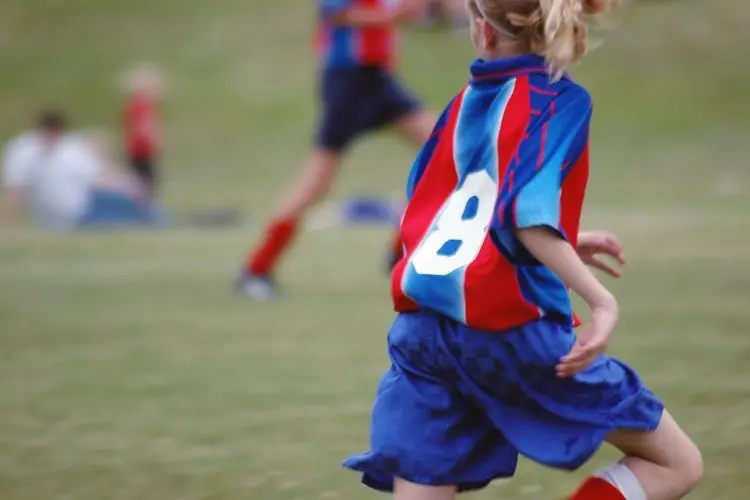
Redefining winning (is how to be more confident in soccer)
The time when it matters is when you are playing professionally. When you are getting paid to win as a part of your JOB. At that point, the game is no longer development focused, it’s 100% outcome based. And that’s okay because everyone wants to do their job well, and in a professional soccer player’s world, doing their job well means WINNING games.
This gets confusing when we see quotes like “winning isn’t everything; it’s the only thing,” from Vince Lombardi, or “the person that said winning isn’t everything, never won anything” from soccer great Mia Hamm. The thing is here, both of these are talking about the professional, elite game. NOT the youth game. Because the youth game is where you need to lose, you need to struggle, and you need to have obstacles to overcome if you want to GET to that professional level. Struggle is a prerequisite for achieving greatness.

If you are focused on playing collegiately or going pro, you want to be the BEST player when you are 18, not the player who won the most games! When you’re 18, nobody is going to care that you lost that tournament final in 9th grade – they are only going to care about WHAT TYPE OF A PLAYER YOU ARE RIGHT NOW. If you only focus on winning during your youth soccer career, you are doing yourself a major disservice.
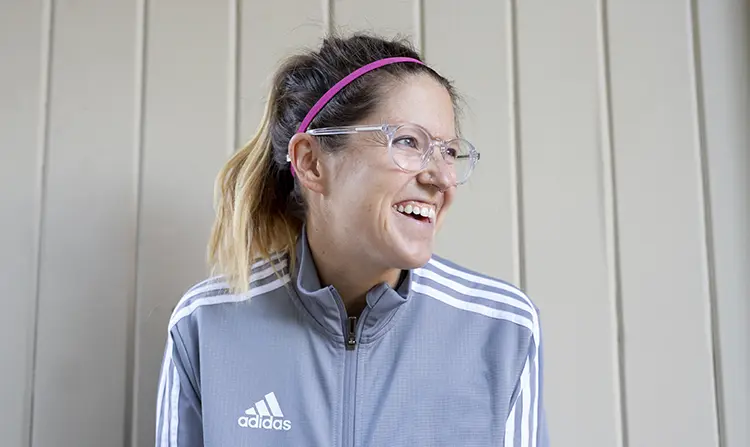
Hi everyone! I’m Jenn and I create content to help female soccer players and coaches maximize individual and team potential by developing healthy mindset skills. Join other subscribers and sign up for the newsletter for all my best tips and advice!
We respect your privacy. Unsubscribe anytime.


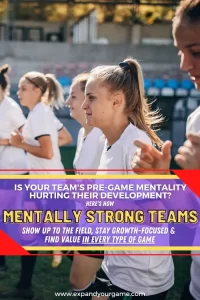
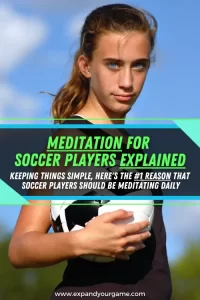
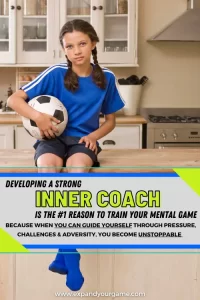
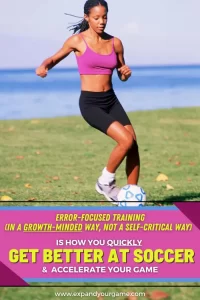
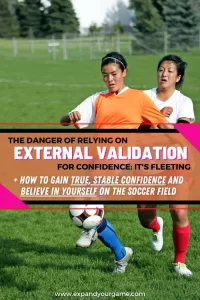


Great article! I love the idea of controllable objectives. As a parent, “I love watching you play” is always my first go to. I think providing feedback on my daughter’s objectives would be beneficial to her in a positive way to help her boost her confidence in her skill set. Thanks!!
Thanks Shannon! You are spot on, parents providing direct feedback on controllable aspects of the game, controllable objectives, is a HUGE confidence booster for players. When they come off that field and the first thing you say to them is “I saw you do __________ and I know you’ve been working on that and it was awesome to see you try it!” their entire perspective changes and they begin to see value in those small pieces of the game. Small pieces which actually are HUGE pieces because it’s THOSE pieces of the process that help players level up their game.
As a parent, the experience is 100% different and more enjoyable when you instead focus on watching for, and praising, the controllable things that your player is doing during games (effort, communication, leadership, picking their head, up positively impacting plays, urgency to recover, etc.). You also get to watch your player gain confidence right in front of your eyes when you tell them how much you enjoyed watching them do THESE THINGS. When players think that goals and winning are the only things that matter, and the things that others (coaches, teammates, parents, etc.) are expecting them to do, then when they don’t meet those expectations they walk away feeling inadequate and like a failure. And that’s whey then stop enjoying the game.